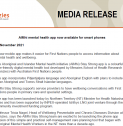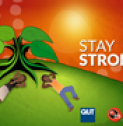e-Mental health programs (also known as digital mental health programs) provide new options for care for people with mental health disorders and wellbeing concerns. They are delivered through phone, computer or online applications and provide health information, peer support, virtual applications and games or real-time interaction with mental health clinicians. e-Mental health services provide an efficient and cost-effective opportunity to reach populations with poor service access.
e-Mental Health in Practice (eMHPrac) is a support service and research collaboration between Queensland University of Technology, University of Sydney, Black Dog Institute and Menzies, funded by the Australian Government to promote and implement e-mental health services in the primary healthcare sector. The role of Menzies within eMHPrac is to promote use of culturally appropriate e-mental health supports amongst service providers working with First Nations clients. We are developing and delivering training and implementation support in e-mental health and evaluating progress. This includes supporting and evaluating the implementation of the AIMhi Stay Strong App, a tablet-based therapy designed to assist First Nations people, and the Weathering Well App, which supports people in farming communities.
Training:
Free training workshops are provided to health and community service providers in selected sites across Australia. The training course builds awareness and skills in using e-mental health tools in practice, with a focus on the AIMhi Stay Strong App. The train the trainer course addresses development and delivery of training in e-mental health for those with existing trainer skills to assist them to train others within their organisation beyond the life of the project.
Extended implementation support:
We also provide an optional implementation support program. The implementation support program involves formal agreement within the organisation to work together with Menzies to address challenges to implementation. This program includes adapting the e-mental health training program to service providers’ needs, as well as facilitated implementation support workshops, both before and after training.
Click here to download the training flyer.
The team:
Chief investigators:
Contact information:
Project dates:
The project commenced in 2013 and will conclude in mid-2021.
Funder:
- Commonwealth Department of Health
Collaborators:
- Queensland University of Technology
- University of Sydney
- Black Dog Institute
- Stay Strong News - March 2020 edition
- Stay Strong News - December 2019 edition
- Stay Strong News - October 2019 edition
- Stay Strong News - July 2019 edition
- Stay Strong News - April 2019 edition
- Stay Strong News - December 2018 edition
- Stay Strong News - July 2018 edition
- Stay Strong News - March 2018 edition
- Stay Strong News - September 2017 edition
- Stay Strong News - December 2016 edition
- Stay Strong News - September 2016 edition
- Stay Strong News - June 2016 edition
- Stay Strong News - December 2015 edition
- Stay Strong News - October 2015 edition
- Stay Strong News - June 2015 edition
-

AIMhi mental health app now available for smart phones
The AIMhi Stay Strong app is a colourful, user-friendly digital mental health tool developed by Menzies with Australian First Nations people.
-
Stay Strong News - March 2020
-

At Pioneer FC, suicide does discriminate
Gary Robinson, a suicide researcher at Menzies School of Health Research in Darwin, traces a wave of suicides that hit Western Australia’s Kimberley region in recent years to the arrival of alcohol and cash-based economies, and a breakdown of cultural authority structures
-

Mental health app reaches out to Indigenous Australians
A pioneering iPad app which visually represents an individual’s strengths and weakness is hoping to significantly improve Indigenous mental health; one of the nation’s fastest growing health problems.
- Puszka, S., Dingwall, K., Sweet, M. and Nagel, T. (2016). E-mental health innovations for Aboriginal and Torres Strait Islander Australians: A qualitative study of implementation needs in health services. JMIR Mental Health, 3(3): e43.
- Povey, J., Mills, P., Dingwall, K., Lowell, A., Singer, J., Rotumah, D., Bennett-Levy, J., and Nagel, T. (2016). Acceptability of mental health apps for Aboriginal and Torres Strait Islander Australians: A qualitative study. Journal of Medical Internet Research, 18(3), e65.
- Dingwall, K., Puszka, S., Sweet, M., Mills, P.P., and Nagel, T. (2015). Evaluation of a culturally adapted training course in Indigenous e-mental health. Australasian Psychiatry, 23(6), 630-635.
- Dingwall, K.M., Puszka, S., Sweet, M., and Nagel, T. (2015). “Like drawing into sand”: Acceptability, feasibility and appropriateness of a new e-mental health resource for service providers working with Aboriginal and Torres Strait Islander people. Australian Psychologist, 50, 60-9.

.png&w=770&h=329)